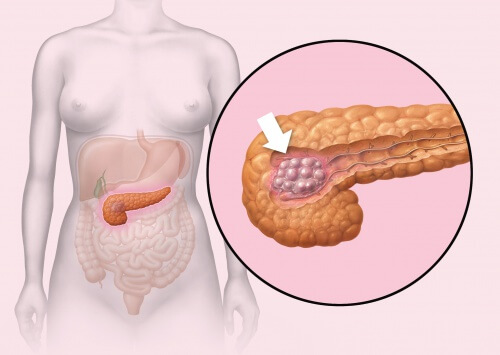An Alarming Increase in Pancreatic Cancer


Written and verified by psychologist Valeria Sabater
There has been an alarming increase in pancreatic cancer in recent years. According to the WHO (World Health Organization), it is currently among the 5 deadliest cancers, behind lung, breast, stomach, and colon cancer.
But according to research published in specialized magazines like Science Daily, in 2030 it could even become the second most deadly. This is extremely worrying, especially considering the fact that this type of cancer generally goes undetected and is asymptomatic at first.
You can’t forget one important fact, however. If pancreatic cancer is going to rank higher in the upcoming decades, this means that science has advanced and death rates from breast or colon cancer have continued to decline.
This is something positive to keep in mind. We can’t forget that cancer is a disease we need to treat, not a death sentence. It means you need to fight, and have confidence in science, which keeps advancing every day.
Today, we would like to talk about what could be causing this increase in pancreatic cancer.
See also: First Signs of Cancer That 90% of People Ignore
The increase in pancreatic cancer
One fact that you can’t ignore is that life expectancy is growing higher and higher. This means there’s a larger population of elderly individuals that could develop certain diseases.
Pancreatic cancer generally appears between 46 and 75 years of age. The most common age to be diagnosed, however, is 71. From then on, your risk of contracting pancreatic cancer increases.
If you add certain risk factors to this, like smoking, family history or certain pancreatic diseases, the number of cancer patients increases.
- When it comes to pancreatic cancer, you can’t attribute 100% of it to these factors. Experts indicate that currently we still do not know exactly what causes this disease.
People around the age of 40, for example, that lead a healthy lifestyle, can still be diagnosed with pancreatic cancer.
This is why scientists say that the most difficult part of controlling this disease is related to the following:

The complexity of diagnosing
As we talked about earlier, one reason for the increase in pancreatic cancer, and that it may become the second most deadly cancer (after lung cancer), is that breast, stomach, or colon cancer sufferers have a great life expectancy, thanks to better treatments.
- Basically what happens is that pancreas is located deep within the abdomen. It’s difficult to visualize it with conventional exploration methods.
- Another thing to remember is that patients generally don’t experience symptoms during the first stages, which is precisely when the disease is most easily treated. It is definitely complex.
Research results
Scientists published this study around the world with one very clear purpose. Their aim was to make large organizations aware of the need to invest in better methods, and better treatments.
The other great need is for more experts who are capable to carry our deeper research into this type of cancer. In a few years, it could become one of the most lethal types.
In the meantime, they continue fighting around the clock to deal with an older population that is at higher risk of contracting certain types of diseases. These diseases are considered to be serious, and it is absolutely vital that we invest more money in health and medicine.
We know that there is no way to 100% avoid this, or any other type of cancer. But it’s always an advantage if you look after your lifestyle in order to fight against it, using your natural defenses, antibodies and energy…
Read more: Scientific Advances Develop Vaccine Against Cancerous Tumors

Factors to keep in mind
Keeping these things in mind could help you fight off pancreatic cancer:
- Avoid bad habits, like smoking or drinking alcohol
- Fight obesity
- Avoid leading a sedentary lifestyle: put your body in motion every day by going on walks or doing simple aerobic exercises
- Pancreatic cancer is more common in diabetic patients. It’s important to keep this in mind.
- Having chronic pancreatitis is another factor. If this is your case, you should definitely get more tests done, and take more control measures.
- Increase your consumption of vitamin C, fluids, fresh produce, and foods rich in antioxidants. Also, see your doctor about taking extra vitamin D supplements.
- Avoid foods that are high in fat, and don’t forget to consume olive oil and easily digested grains.
All cited sources were thoroughly reviewed by our team to ensure their quality, reliability, currency, and validity. The bibliography of this article was considered reliable and of academic or scientific accuracy.
- Neoptolemos, J. P., Urrutia, R., Abbruzzese, J. L., & Büchler, M. W. (2018). Pancreatic Cancer. Pancreatic Cancer. https://doi.org/10.1007/978-1-4939-7193-0
-
Huggett, M. T., & Pereira, S. P. (2011). Diagnosing and managing pancreatic cancer. In Practitioner.
-
Eguia, V., Gonda, T. A., & Saif, M. W. (2012). Early detection of pancreatic cancer. JOP : Journal of the Pancreas. https://doi.org/10.1097/MEG.0000000000000727
This text is provided for informational purposes only and does not replace consultation with a professional. If in doubt, consult your specialist.








